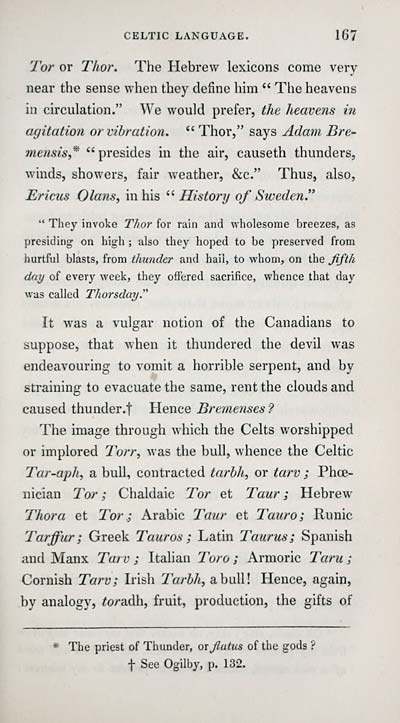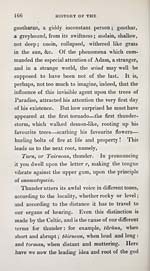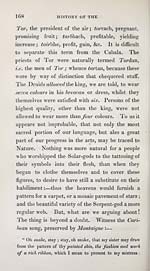Download files
Complete book:
Individual page:
Thumbnail gallery: Grid view | List view

CELTIC LANGUAGE. 167
Tor or Thor. The Hebrew lexicons come very
near the sense when they define him " The heavens
in circulation." We would prefer, the heavens in
agitation or vibration. " Thor," says Adam Bre-
mensis* "presides in the air, causeth thunders,
winds, showers, fair weather, &c." Thus, also,
Ericus Olans, inhis " History of Sweden."
" They invoke Thor for rain and wholesorae breczes, as
presiding on high ; also they hoped to be preserved from
hurtfiil blasts, from thunder and haii, to vphom, on the Jifth
day of every weelc, they oft'ered sacrifice, whence that day
was called Thorsday."
It was a vulgar notion of the Canadians to
suppose, that when it thundered the devil was
endeavouring to vomit a horrible serpent, and by
straining to evacuate the same, rent the clouds and
caused thunder.t Hence Bremenses 9
The image through which the Celts worshipped
or implored Torr, was the bull, whence the Celtic
Tar-aph, a buU, contracted tarbh, or tarv ; Phoe-
nician Tor ; Chaldaic Tor et Taur ; Hebrew
Thora et Tor ; Arabic Taur et Tauro; Runic
Tarffur ; Greek Tauros ; Latin Taurus; Spanish
and Manx Tarv ; Italian Toro ; Armoric Taru ;
Cornish Tarv; Irish Tarbh, abuU! Hence, again,
by analogy, toraàh, fruit, production, the gifts of
* The priest of Thunder, oxjlutiis of the gods ?
t See Ogilby, p. 132.
Tor or Thor. The Hebrew lexicons come very
near the sense when they define him " The heavens
in circulation." We would prefer, the heavens in
agitation or vibration. " Thor," says Adam Bre-
mensis* "presides in the air, causeth thunders,
winds, showers, fair weather, &c." Thus, also,
Ericus Olans, inhis " History of Sweden."
" They invoke Thor for rain and wholesorae breczes, as
presiding on high ; also they hoped to be preserved from
hurtfiil blasts, from thunder and haii, to vphom, on the Jifth
day of every weelc, they oft'ered sacrifice, whence that day
was called Thorsday."
It was a vulgar notion of the Canadians to
suppose, that when it thundered the devil was
endeavouring to vomit a horrible serpent, and by
straining to evacuate the same, rent the clouds and
caused thunder.t Hence Bremenses 9
The image through which the Celts worshipped
or implored Torr, was the bull, whence the Celtic
Tar-aph, a buU, contracted tarbh, or tarv ; Phoe-
nician Tor ; Chaldaic Tor et Taur ; Hebrew
Thora et Tor ; Arabic Taur et Tauro; Runic
Tarffur ; Greek Tauros ; Latin Taurus; Spanish
and Manx Tarv ; Italian Toro ; Armoric Taru ;
Cornish Tarv; Irish Tarbh, abuU! Hence, again,
by analogy, toraàh, fruit, production, the gifts of
* The priest of Thunder, oxjlutiis of the gods ?
t See Ogilby, p. 132.
Set display mode to: Large image | Transcription
Images and transcriptions on this page, including medium image downloads, may be used under the Creative Commons Attribution 4.0 International Licence unless otherwise stated. ![]()
| Early Gaelic Book Collections > Hew Morrison Collection > Adhamh agus Eubh, no Craobh Sheanachais nan Gàël > (297) |
|---|
| Permanent URL | https://digital.nls.uk/76900309 |
|---|
| Description | A selection of items from a collection of 320 volumes and 30 pamphlets of literary and religious works in Scottish Gaelic. From the personal library of Hew Morrison, the first City Librarian of Edinburgh. |
|---|
| Description | Selected items from five 'Special and Named Printed Collections'. Includes books in Gaelic and other Celtic languages, works about the Gaels, their languages, literature, culture and history. |
|---|

